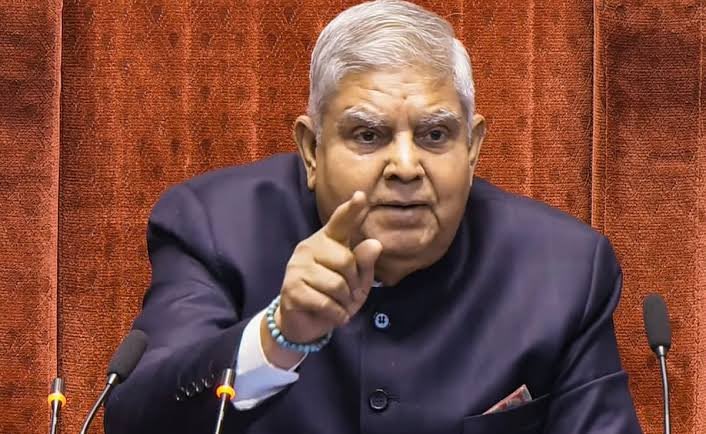Vice President Jagdeep Dhankhar resigned, citing health concerns, marking a rare and abrupt change in India’s political landscape. The country’s second-highest constitutional position is now vacant as a result of this development, which occurred just before crucial legislative activity in Parliament. In the Upper House of Parliament, where the Vice President serves as the Chairperson of the Rajya Sabha, it also calls into question continuity.
Late on July 21, Dhankhar submitted his resignation, which was immediately accepted. The news spread throughout political circles, eliciting reactions ranging from sincere worries about his health to conjecture regarding the timing of the departure. His exit signals the end of a demanding two-year term during which he actively engaged with lawmakers, vigorously moderated parliamentary debates, and frequently stood firmly in support of the Treasury benches during contentious political sessions.
During his tenure, Dhankhar developed an authoritative and assertive public persona. In contrast to many of his predecessors who took a more ceremonial or impartial stance, he frequently took center stage and was not hesitant to confront the opposition and call out disturbances. He was a special member of the Upper House because of his capacity to draw attention and keep things under control during tumultuous parliamentary moments. Supporters of the ruling regime praised him for his audacity, but the opposition also criticized him, seeing his actions as occasionally partisan.
Harivansh Narayan Singh, the Rajya Sabha’s deputy chairperson, will now temporarily take over as presiding officer since Dhankhar’s seat is vacant. As the Monsoon Session of Parliament gets underway, his role becomes increasingly important. Major legislation pertaining to economic reform, defense procurement, and technology regulation is anticipated to be introduced this session; all of these issues call for stable and seasoned Rajya Sabha leadership.
According to the constitution, the process of choosing a new vice president is already in progress behind closed doors. The Constitution’s Article 66 stipulates that the position must be filled within six months. Using a proportional representation system, an electoral college made up of members from the Lok Sabha and Rajya Sabha chooses the vice president. The election schedule is anticipated to be released soon by the Election Commission.
This resignation comes at a delicate political moment. The selection of a new vice president will have significant strategic ramifications for both the opposition INDIA bloc and the ruling NDA alliance, as general elections are scheduled for 2026. The choice of the candidate will still be closely watched, even though the BJP-led NDA has a numerical advantage in both Houses and is therefore in a strong position. According to political analysts, the BJP might take advantage of this chance to select a representative who aligns with its long-term goals, possibly even someone with experience that could strengthen its caste or regional alliances prior to the national elections.
On the other hand, despite the low likelihood of electoral success, the opposition alliance is probably going to put up a single candidate as a show of solidarity. As opposition parties prepare for the 2026 elections, the action might still help them gain traction, test internal unity, and lay the groundwork for more expansive political messaging.
The resignation of Jagdeep Dhankhar is more than a formality. It touches upon the stability of Parliament, the balance of power between the executive and the legislature, and the broader tone of political discourse in India. His method of running Parliament, which was frequently characterized by stern criticism and rigorous punctuality, established a standard for how vice presidents in the future could exercise their power in the Rajya Sabha. His departure at this time makes room for a different type of leadership, depending on who is selected to fill the position, which could be more assertive, more diplomatic, or neutral.
There has been a wide range of respectful responses from the public. Social media has been used by citizens to show their gratitude for his commitment and dedication, while political insiders examine the true causes of his abrupt departure. His admirers have celebrated the trajectory of a career that embodied both merit and tenacity by highlighting his journey from a modest Rajasthani farming family to the position of vice president. However, critics highlight the need for a less combative and more inclusive approach to Upper House leadership, particularly in these politically charged times.
The importance of personalities in Indian politics has been further revealed by this leadership void. A strong vice president has the power to affect not only the climate within Parliament but also the public’s opinion of how effective the government is. This period of transition in the Rajya Sabha will be closely watched because there are still bills to be paid and the monsoon session is expected to be very active.
Not only will a position need to be filled, but the government’s legislative approach will also need to be adjusted. The ruling coalition needs to make sure that the next vice president is chosen with both political maturity and competence. Despite having fewer members, the opposition will probably take advantage of this opportunity to voice concerns about accountability, transparency, and inclusiveness in high-ranking positions.
The vice president’s office, which is frequently seen as ceremonial, has a far more active and significant role in the operation of democracy than many people realize, especially as India prepares for this transition. Not only will the next election decide who holds the position, but it will also determine the type of parliamentary culture the country decides to cultivate in the years to come.
